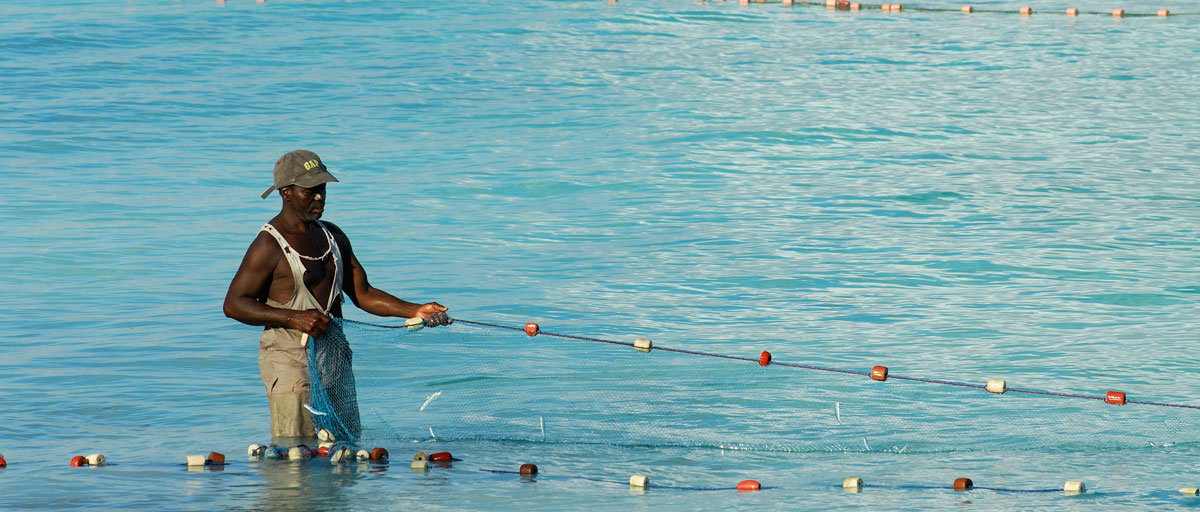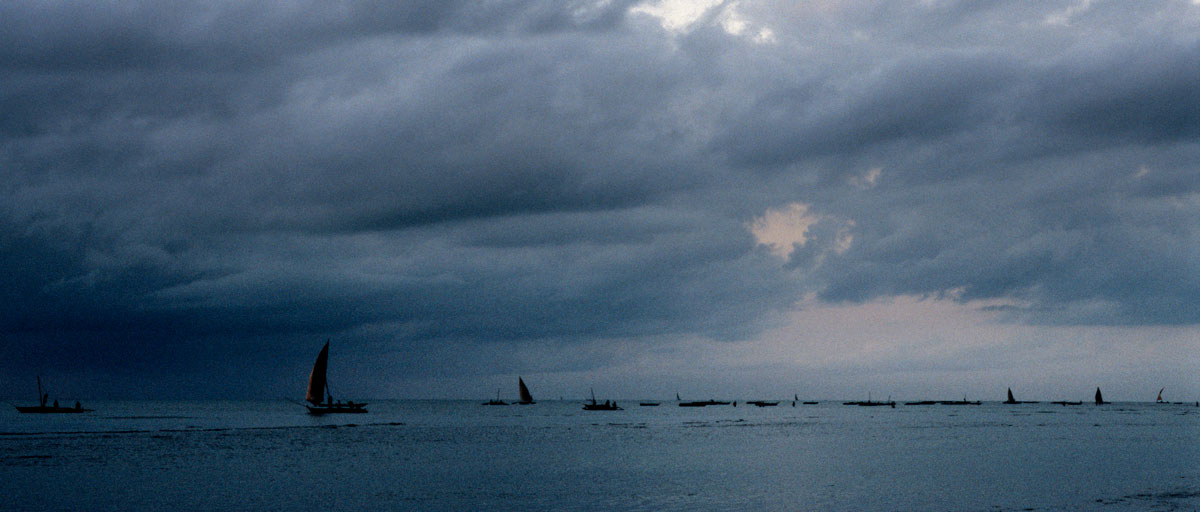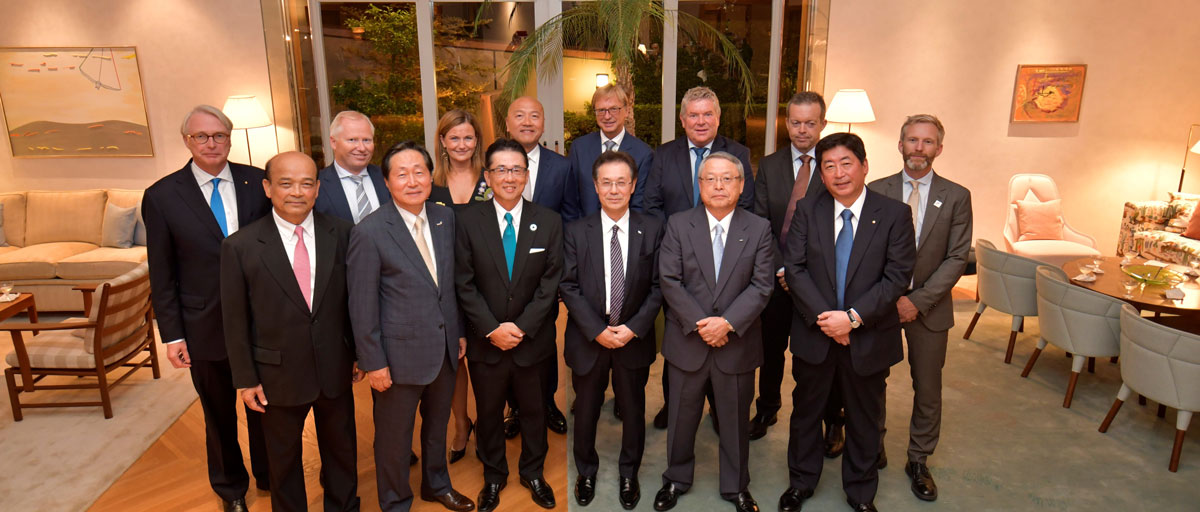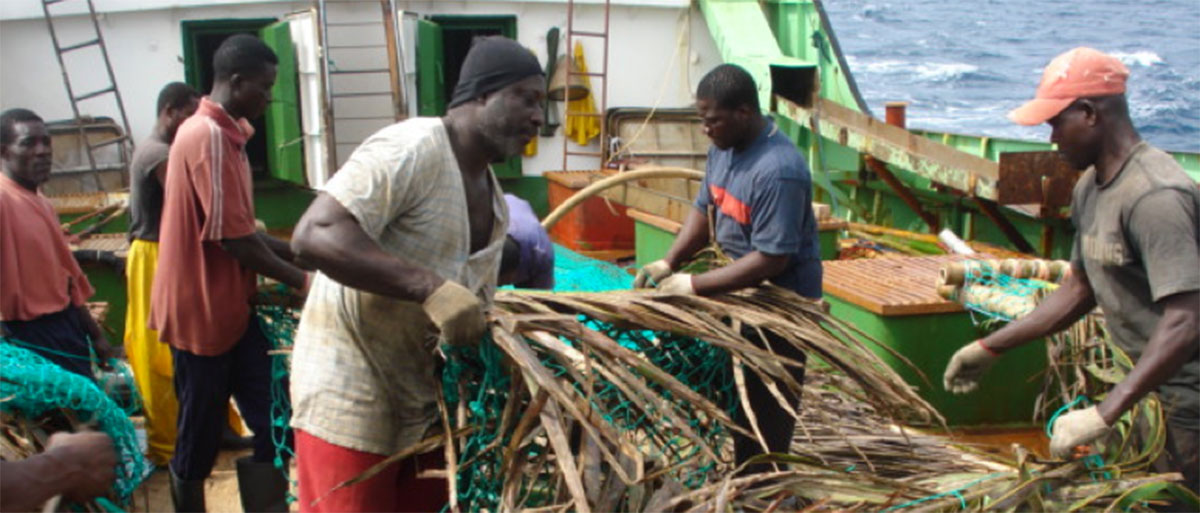
Female tuna fish traders in Ghana called "Big Mammies" have created a niche for themselves in a typically male-dominated industry because they are central to the local trade of tuna. They also act as financiers of many fishing expeditions but large-scale fishing fleets backed by major Asian seafood companies are taking over. Photo: P. Bannerman/MFRD
Bildtext får vara max två rader text. Hela texten ska högerjusteras om den bara ska innehålla fotobyline! Photo: B. Christensen/Azote
Ghana’s tuna industry
No place for Big Mamma
Ghana’s unique female intermediaries are increasingly squeezed out by global seafood companies
- Tuna has been exploited in Ghana for centuries but over the past 50 years it has developed into a global industry
- Female traders called Big Mammies are responsible for sales of up to 25% of the landed tuna to the local market (they are responsible for virtually all sales into the local market channel from Ghana's industrial fleet) . They are key to the Ghanaian tuna industry because they also act as financiers of many fishing expeditions
- But large-scale fishing fleets backed by major Asian seafood companies are taking over. Ghana’s tuna industry, including the Big Mammies, are therefore dependent on the willingness of these major actors to drive positive change and make sure local livelihoods are not squeezed out.
If you live somewhere in Europe and you like canned tuna, chances are it could be from Ghana. The fast-swimming saltwater fish has been exploited in Ghana for centuries but over the past 50 years it has developed into a global industry with the European Union being their biggest market. Still, local markets remain important with high demands for tuna (largely smoked) and women play a powerful part in both supplying these demands and funding the industrial fleet.
A unique niche that is changing
The women, or "Big Mammies" as they are known, enter the tuna fish industry at a young age and are responsible for up to 25% of the sales of landed tuna to the local market. They are key to the Ghanaian tuna industry because they also act as financiers of many fishing expeditions. That gives them rights to huge parts of the catch.
The role of the women is also established through local female traders known as "Fish Mammies" who are linked to the "Big Mammies" through sales and credit arrangements.
By providing large sums of capital to an industrial tuna fishing fleet the Ghanaian female intermediaries are unique because they have managed to create a niche for themselves in a typically male-dominated global industry.
But things are changing.
More efficient and profitable boats
Bait-boating, also know as pole and line, which involves fishers using fishing rods to individually hook tuna, is the predominant source of income for the "Big Mammies" but is becoming increasingly less profitable in the Ghanaian tuna industry. Instead, large-scale purse-seine fishing backed by major Asian seafood companies are taking over.
They are considered more efficient and profitable because they require less crew and are capable of travelling farther with bigger holding facilities for more tuna. The result is a gradual replacement by purse-seiners, leaving bait-boats and the "Big Mammies" behind.
Elizabeth Drury O’Neill, a PHD student at the centre, warns that the need for their financing activities and provision of funds will most likely be reduced along with their access to tuna for local markets.
"If they are excluded from decision-making, as official statistics and reports show today, then it is very unlikely that they will be included in the future of the global seafood industry," she writes in a study published in the journal African Journal of Marine Science. Together with colleagues from University of Cape Coast in Ghana, she has looked at the changes taking place in the Ghanaian tuna industry.
Link to publication
Request publication
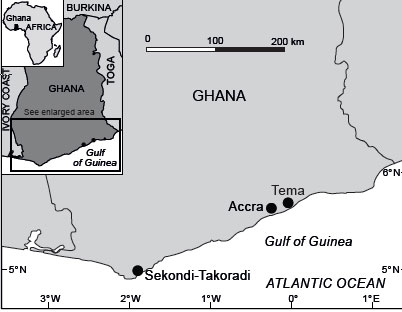
Map showing the study sites of Sekondi-Takoradi, Accra and Tema in Ghana, West Africa.
The big fish are taking over
The results of the study shows that the increasing market power by Asian seafood companies such as Thai Union Group will play a major role in the future sustainability of Ghanaian tuna fisheries.
"The big companies are backed, and ultimately protected, by larger parent corporations which have access to substantial capital – vital in a fishery where significant losses can be incurred," Drury O’Neil and her colleagues write.
These big companies are considered "keystone actors" because they dominate all segments of global seafood production and revenues while also controlling huge proportions of global marine stocks.
With that name tag also comes responsibilities. As IUU continues to impact the industry’s future prospects (tuna stocks continue to decline), better monitoring, control and surveillance is needed. But that requires funding, which West African countries do not have. As a result, any upgrades to monitoring and control must come from external investors, but they will still be entangled in weak governance, corruption and conflicts of interest among the countries in the region.
Better monitoring needed
Ghana’s tuna industry, including the "Big Mammies", are therefore dependent on the willingness of these keystone actors to drive positive change and make sure local livelihoods are not squeezed out.
"The lack of interaction and eventual cooperation seen in Ghana, between the private sector and formal governance, can and should be combated during formulation of agreements and partnerships," says Drury O’Neill.
In fact, she argues, a critical area of African fisheries reform lies in the negotiation stages of licenses and access, which are today very secret.
"Negotiations need to be made public and should engage, if present, African civil society organisations that can demand good governance through scrutinizing, tracking and monitoring," she concludes.
Methodology
Data were collected from Tema, Accra and Sekondi-Takoradi in Ghana, where the industrial tuna fishery and most governmental institutions are located. A total of 31 companies, organisations and government ministries formed part of this study. Data were collected between March-May 2013.
Primary data collection included the use of a standardised questionnaires, semi-structured interviews and participatory observations. Fieldwork targeted three categories of respondents: governmental (e.g. ministries and departments; the Food and Agriculture Organization of the United Nations (FAO), private (fishing and food-processing companies) and non-governmental (e.g. WorldFish). Respondents included company directors, sectoral managers, ministerial heads, state employees, researchers and fisheries officers. The questionnaire was structured to collect data specifically about (i) general conditions and the current business climate, (ii) fishing and processing activities, (iii) rules and regulations, (iv) links and actors, (v) upgrading and improvements, and (vi) revenue flow. Secondary data collection encompassed a desktop review of the literature together with the data gathered from institutional and organisational repositories in Ghana, and included multiple empirical data types.
Link to publication
Request publication
Drury O’Neill, E., N.K., Asare, D.W., Aheto. 2018. Socioeconomic dynamics of the Ghanaian tuna industry: a value-chain approach to understanding aspects of global fisheries. African Journal of Marine Science, 40:3, 303-313, DOI: 10.2989/1814232X.2018.1513866
Elizabeth Drury O'Neill works on challenges around Small-Scale Fisheries Governance. Her PhD project takes a systems perspective to look at governance, the associated market influences and the consequent benefit flows from marine ecosystem services. The research uses mixed-methods and is case-orientated with sites in Zanzibar and the Philippines.
